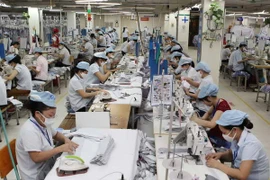Tra Vinh (VNS/VNA) - The Mekong Deltaprovince of Tra Vinh plans to increase the production values of theagro-forestry-fishery sector by more than 4 percent by 2020, according to theprovincial People’s Committee.
At a conference reviewing the last five years ofagricultural restructuring, Chairman of the provincial People’s Committee KimNgoc Thai said that labour productivity would increase by more than 5 percentby 2020.
The number of rural labourers in the sectorwould be under 40 percent, while the number of trained labourers in agriculturewould increase to nearly 50 percent, according to Thai.
Moreover, the province aims to double the incomeof local residents by 2020 against the level in 2013.
To obtain the targets, the province’s project onagricultural restructuring will be carried out by improving the added value ofagricultural products and developing sustainable agriculture, Thai said.
The province will choose eight products,including paddy rice, coconut, other fruits, beef and seafood that havepotential for development.
Thai proposed that the Government issue a policyon new production that can produce high added-value agricultural products withadvanced technology.
The Government should also provide funds forinfrastructure and irrigation projects for aquatic cultivation.
Between 2013 and 2017, the annual GDP growthrate for agriculture was 1.45 percent, or more than 35.5 trillion VND (1.5billion USD) per year, accounting for nearly 36 percent of the province’s totalproduction value.
In 2017, the production value of crops reachednearly 127 million VND per ha, an increase of more than 19 million VND per hacompared to the one in 2013.
The production value for aquatic cultivationreached nearly 284.5 million VND per ha, increasing by nearly 78 million VNDper ha.
The average income per capita in the province’srural areas last year was 29 million VND, 1.7 times higher than in 2013.
Since 2014, the province has shifted 13,300 haof rice cultivation to other agricultural and aquatic products, leading to anincrease of 1.5 to 4 times in production compared to rice cultivation.
However, there is limited co-operation betweenproduction and consumption of agricultural products, leading to erratic salesof many products.
Nguyen Van Nhiem, Chairman of the People’sCommittee of Phu Can commune in Tieu Can district, said that farmers with safeproducts had difficulty in signing contracts with enterprises.
Ngo Thanh Xuan, Vice Chairman of the Cau KeDistrict People’s Committee, said farmers in the district had the same problem.
Xuan proposed that the province providedassistance in building value chain models in co-operative production.
Pham Minh Truyen, Deputy Director of theprovincial Department of Agriculture and Rural Development, said that localauthorities were uncertain about providing guidance on what to plant and breedto meet market demand.
The province has also faced problems calling onenterprises to cooperate in production, processing and consumption, Truyensaid.
Most agricultural production in the locality ison a small scale, leading to difficulties in building brand names and applyinghigh-tech, he said, adding that most farmers have not accessed preferentialpolicies.
Nguyen Thien Nghia, Deputy Director of theprovincial Department of Science and Technology, said that production costs foragricultural products were higher than in other countries, leading to lesscompetitive products, especially those that can meet export demand.-VNS/VNA





























